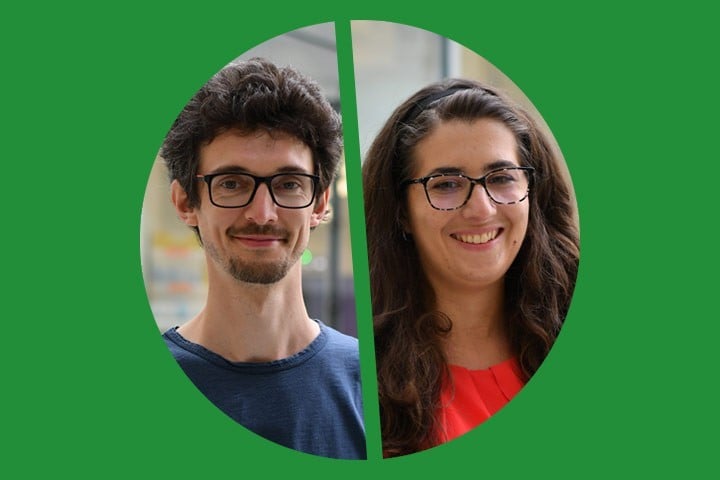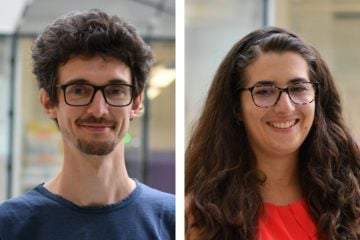
Interview: Jonathan Elegheert and Brigitt Raux
 Jonathan Elegheert’s team (“Structural biology and engineering of neuronal signaling”) was created in 2018 with a Junior Team Leader chair of the Neurocampus program funded by the Région Nouvelle-Aquitaine. We met him and Brigitt Raux, who just joined him a a post-doc.
Jonathan Elegheert’s team (“Structural biology and engineering of neuronal signaling”) was created in 2018 with a Junior Team Leader chair of the Neurocampus program funded by the Région Nouvelle-Aquitaine. We met him and Brigitt Raux, who just joined him a a post-doc.
Bordeaux Neurocampus : What is the research axis of the team?
Jonathan Elegheert: We are structural biologists, which means that we aim to determine the 3-dimensional structures of proteins and their complexes in atomic detail, to understand their biological functions. To this end, we use techniques such as protein crystallography and single-particle cryo-electron microscopy. We supplement this with biophysical techniques for quantifying protein-protein interactions. Thematically, we are interested in the molecular processes that underly synapse formation and function. By solving structures of synaptic protein complexes, we aim to determine the structural basis for synaptic adhesion and neurotransmission.
We are also introducing methods borrowed from immunology, such as engineering of protein-protein interfaces to modify cell signalling outcomes. Finally, we are working on establishing a platform for the discovery of synthetic nanobodies (single-chain antibodies) against any neuronal receptor or protein, to aid structure determination but also to enable in situ super-resolution imaging or therapeutic targeting of these neuronal proteins.
Even when doing basic research, are you sometimes confronted with the clinical aspects or research?
What were the challenges when starting your team?
J.E. When I joined the IINS early 2019 on an IdEx fellowship funded by the University of Bordeaux, I knew I would have to take the time to invest and build things from the ground up. We spent a lot of time and effort in installing and equipping our lab spaces, and because of generous funding by the regional council we now have a lab equipped with everything we need for molecular biology, mammalian protein production, protein purification, yeast culture, and cell sorting. Add to this the IINS platforms for molecular and cellular biology, and we really have a premium setup.
By far the biggest challenge now is to recruit good people! I very deliberately joined the IINS to be close to the neuroscience, but it also means that perhaps my visibility is a bit lower for biochemists or structural biologists who would typically look more into joining places like the IECB (Institut Européen de Chimie et Biologie) here in Bordeaux.
Biology, biochemistry… Many students ask us what path to choose to work in neuroscience. Brigitt Raux, what was yours?
B.R. : After high school, my career ambition was to become a researcher and work on projects related to human disease. I first obtained a bachelor’s degree in biology with a specialization in biochemistry at Lille I University, and then I started a Master’s degree in biochemistry with a specialization in structural and functional biology at Paul Sabatier University (Toulouse). After obtaining my degree came the obstacle course to obtain PhD funding. Together with a team at the AFMB (Architecture et Fonction des Macromolécules Biologiques) in Marseille, I wrote a number of PhD project proposals for the FRM and ANR related to Coronavirus. At that time Coronavirus was not a super attractive target, so none of our proposals got funded! Today, Coronavirus is perhaps the most important target in the world!
Eventually my efforts to apply to the “concours école doctorale” paid off. I started my thesis at the EIPL and worked there for one year on the development of inhibitors targeting digestive enzymes implicated in obesity. I had a very hard time with my PhD supervisor, and we couldn’t fix that. Thanks to the help of the doctoral school, I could change laboratories and keep my PhD funding. I then joined the team of Xavier Morelli at the CRCM (Centre de Recherche en Cancérologie de Marseille) to continue my thesis. My new project was focused on the development of potent and selective inhibitors targeting the BET family of bromodomains, which are proteins implicated in cancer development.
And then you decided to move to UK?
B.R.: Indeed, after my PhD, I moved to the University of Oxford to join the team of Dr. Kilian Huber at the structural genomics consortium (SGC) as a postdoc. I worked for almost two years on a wide variety of projects, all related to cancer or inflammatory diseases. The SGC is an academic lab but mainly funded by pharmaceutical companies. It was a great opportunity to experience the difference between a full academic lab and a joint academic-industrial lab. I am convinced that a postdoc abroad was essential for my career in France even if it was only for 2 years. After this experience, I had the desire to come back to France. After looking for structural biology labs in France, I finally joined the group of Jonathan Elegheert at IINS.
Jonathan, what specifically interested you in Brigitt’s profile?
J.E.: Well, Brigitt has the necessary experience in solving protein crystal structures, but mainly and more importantly it is her motivation to do what it takes to make the project succeed. She is also very keen of learning new things and this mindset is exactly what I wanted, especially for my first postdoc!
Brigitt, after Lille, Toulouse, Marseille and Oxford… here you are in Bordeaux! What made you choose to work here?
B.R. : For my second postdoc, I again looked for a team doing protein crystallography and working on projects related to disease, but this time in France. The interesting thing is, a few months earlier I was discussing with my colleague about one paper that Jonathan published in Nature Protocols. She was struggling with expression of some target proteins and she wanted to try his protocol to get stable cell lines. It was interesting to see that he also used to work in Oxford and that he moved to France to create his own team. Anyway, it took me two weeks to contact Jonathan. I wasn’t sure initially because I don’t have a background in neuroscience and the deadline to apply to the postdoc position had expired.
Finally, the research project was crucial. Of course, I was interested in what Jonathan’s team was planning to do, tackling structure-function of neuronal protein complexes, but I was a bit uneasy because of my lack of knowledge in neuroscience. Jonathan gave me a very nice and clear overview of the project during the interviews. I was very excited to join his team because of the opportunity to learn a lot in a new field. I really care about acquiring a strong multidisciplinary background because I am convinced that will have a strong impact on the success of the research projects in which I am involved.
Were there other reasons to choose Bordeaux?
B.R. : Well, my past experiences (good and bad) made me stronger and gave me a better idea of what I wanted for my career. I wanted to work with a PI who cares about doing good science and publishing in relevant journals, but who also cares about people. I am convinced it is easier to work in a good atmosphere than with tension between colleagues. This is why I paid attention to find a friendly team and institute. Also, I looked for a small team because I really want to obtain a CR position to eventually stay in the team.
I had the opportunity to work in different labs in France and the UK, and I believe that the place where you work (infrastructure, quality of the team’s funding, the ease of access to equipment, the potential to collaborate with other researchers inside the institute) has a strong impact on what you can achieve; all these things are definitely present at the IINS!
In view of the “Sauvadet” law and the difficulty of obtaining a CR position, I had to try to make the right decisions and choose the best lab to come back to France. I hope and I think that I did.
Jonathan, you were awarded an ERC, in which way did it or will it help you lead your projects?
J.E. Getting the ERC starting grant on my first try was a big relief, since it was my last chance to go for it, 7 years after the start of my postdoc. It’s very nice to get the confirmation of peers that what I propose to do is relevant and important. Of course, it gives the financial freedom to really focus on the work for the upcoming 5 years, a real luxury in a funding landscape that can be very fragmented, and where budgets are restricted. Also, having an ERC gives me good visibility on the international stage, I definitely noticed an increase in invitations to speak at symposiums and workshops, and in the number of foreign (non-French) applicants.
More details
About Brigitt Raux (contact, publications)
About Jonathan Elegheert (contact, publications)
Last update 16/09/20
